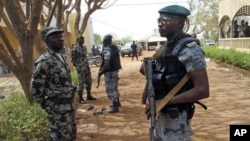The U.N. refugee agency reports thousands of people in northern Mali continue to flee their homes because of insecurity and political instability. The UNHCR is expressing deep concern about the crisis, which is getting worse as Mali coup leaders lose control of the north to Tuareg rebels.
The U.N. refugee agency reports more than 2,000 Malians have fled to Burkina Faso and Mauritania over the past five days. It says the north of the country is becoming more and more dangerous due to the proliferation of armed groups in the region.
UNHCR spokeswoman Melissa Fleming said refugees pouring into neighboring countries report that local communities are using armed militiamen and home guard units to defend themselves from attacking marauders.
“They are telling us that they are fleeing because of generalized violence, but also mayhem in these towns and cities is increasing, the numbers of armed robbers, of instability. They are also reporting lack of food," said Fleming. "They are reporting steep price rises and are just really concerned about sustaining themselves. But, also, they are telling us that they had hopes that this coup might bring peace to the country and when they saw that this was falling apart, they decided to leave.”
Things have gone badly wrong for the military leaders of Mali since they mounted a political coup in the capital, Bamako on March 22. The rebel soldiers said they ousted the elected president, Amadou Toumani Toure, because he left the army poorly equipped to fight the Tuareg rebels in the north.
However, since the coup, the rebels have captured the strategic town of Kidal, the garrison town of Gao and just a few days ago, the ancient, mythic town of Timbuktu.
Fleming said the UNHCR is worried that the fallout from this rebellion could have serious consequences for the stability of West Africa's Sahel region.
“Of course, we are a humanitarian organization and we are - sometimes we are called the pulse of human suffering, and the pulse of human suffering often spells fallout from conflict. But certainly, when you have this kind of cross-border displacement, it is of great concern for the stability of the region in countries that are facing themselves extreme poverty and drought themselves,” she said.
Mali is one of eight countries in the Sahel facing drought and severe food shortages. Fleming said the UNHCR is stepping up assistance to Malian refugees. At the same time, she said the agency is assisting the local communities hosting the refugees because they, too, are facing acute water and food shortages.
The UNHCR reports more than 200,000 people have been uprooted from their homes in northern Mali since fighting between government troops and Tuareg rebels erupted in January. Of these, more than 93,000 are displaced within the country. The agency notes these people also are in need of humanitarian assistance.
News
Thousands Flee Mali After Coup
- By Lisa Schlein




